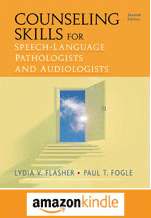New CEU Course for SLPs & Audiologists!
CE Credit: 8 Hours (0.8 ASHA CEUs)
Target Audience: Speech-Language Pathologists & Audiologists
Learning Level: Intermediate
Course Abstract:
This CE test is based on the book “Counseling Skills for Speech-Language Pathologists and Audiologists, 2nd Ed.” (2011, 552 pages). Whether you are a beginning or more experienced speech-language pathologist or audiologist, Counseling Skills for Speech Language Pathologists and Audiologists, 2nd Edition can equip you with effective counseling skills needed to help your clients cope with the challenges of communication disorders. Counseling Skills for Speech-Language Pathologists and Audiologists is the only text available that combines the insights of a well-respected clinical psychologist with the practical knowledge of a recognized speech-language pathologist to highlight the most important basic and advanced counseling skills. Written in user-friendly language, this text places the theories of counseling in real-life contexts that are applicable for today’s speech-language pathologists and audiologists. Numerous, varied examples drawn directly from the first-hand experiences of the authors help you develop relevant and usable skills. Case studies and proven learning features refine your ability to manage even the most challenging emotions, behaviors, and situations. Course #80-50 | 36 posttest questions
Learning Objectives:
- Differentiate purposes and scope of practice of counseling skills needed by SLPs and audiologists
- Describe theories of counseling and characteristics of therapeutic relationships
- Select key issues that should be considered for counseling in a multicultural society
- Identify counseling skills needed for working with a variety of specific disorders
- Identify procedures for working with clients’ defense mechanisms and challenging emotional states
- List methods professionals can use to ensure that they take care of themselves
About the Author(s):
Lydia V. Flasher, PhD, earned her baccalaureate summa cum laude and Phi Beta Kappa from Duke University, and her master’s and doctorate in clinical psychology from Vanderbilt University. Her mentor at Vanderbilt was Hans H. Strupp, a pioneer in psychotherapy research and short-term dynamic psychotherapy. After completing her internship at the Montreal Children’s Hospital, a McGill University teaching hospital, she worked as a staff psychologist in the hospital, specializing in personality assessment, family therapy, and health psychology in pediatric oncology. Dr. Flasher has served as a professor at Colorado State University and the University of the Pacific and has many years of experience teaching graduate students in clinical and counseling psychology. She has served as director of a university training clinic for doctoral students in counseling psychology and has approximately 20 years of experience supervising psychology graduate students, interns, and postdoctoral fellows. Currently, Dr. Flasher serves as Director of the Psychology Training Programs and as staff psychologist at the Children’s Health Council in Palo Alto, California. In her administrative role, she is co-director for an APA-approved, pre-doctoral psychology internship consortium between Stanford University’s Packard Children’s Hospital and Children’s Health Council. She also directs a clinical psychology postdoctoral fellowship program. In her direct clinical work, she specializes in multidisciplinary assessments, anxiety disorders, and family therapy.
Paul T. Fogle, PhD, CCC-SLP, earned his Bachelor of Arts and his Masters of Arts at California State University, Long Beach. After receiving his M.A., he started the first high school aphasia class in California, working with adolescents who had sustained traumatic brain injuries, strokes, and other neurological impairments. Dr. Fogle also worked as a therapist at the UCLA Psychology Adult Stuttering Clinic during this time. Dr. Fogle earned his doctorate from the University of Iowa and went on to teach undergraduate courses on Introduction to Speech-Language Pathology and Audiology, Anatomy and Physiology of Speech, and Speech Science. At the graduate level he has taught Neurological Disorders in Adults, Motor Speech Disorders, Dysphagia/Swallowing Disorders, Gerontology, Voice Disorders, Cleft Palate and Oral-Facial Anomalies, and Counseling Skills for Speech-Language Pathologists. Dr. Fogle has worked extensively in hospitals while also maintaining a year-round private practice for over 35 years. He has presented at state, ASHA, international (IALP), and Asia-Pacific Society for the Study of Speech-Language Pathology and Audiology conferences. Dr. Fogle has been involved with forensic speech-language pathology (court testifying as an expert witness) for over 25 years and has published and presented on that topic. Most recently he has been the speech-language pathologist on Rotaplast (Rotary) International Cleft Palate teams in Venezuela, Egypt, and India.
Accreditation Statement:

This course is offered for .8 ASHA CEUs (Intermediate level, Professional area).
ASHA credit expires 07/20/2014. ASHA CEUs are awarded by the ASHA CE Registry upon receipt of the quarterly completion report from the ASHA Approved CE Provider. Please note that the date that appears on ASHA transcripts is the last day of the quarter in which the course was completed.

